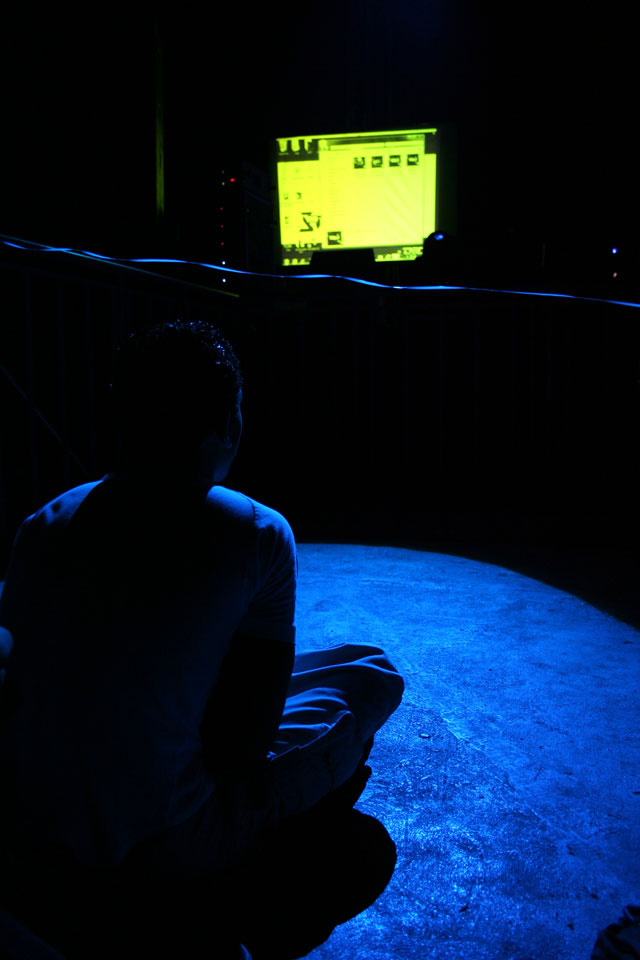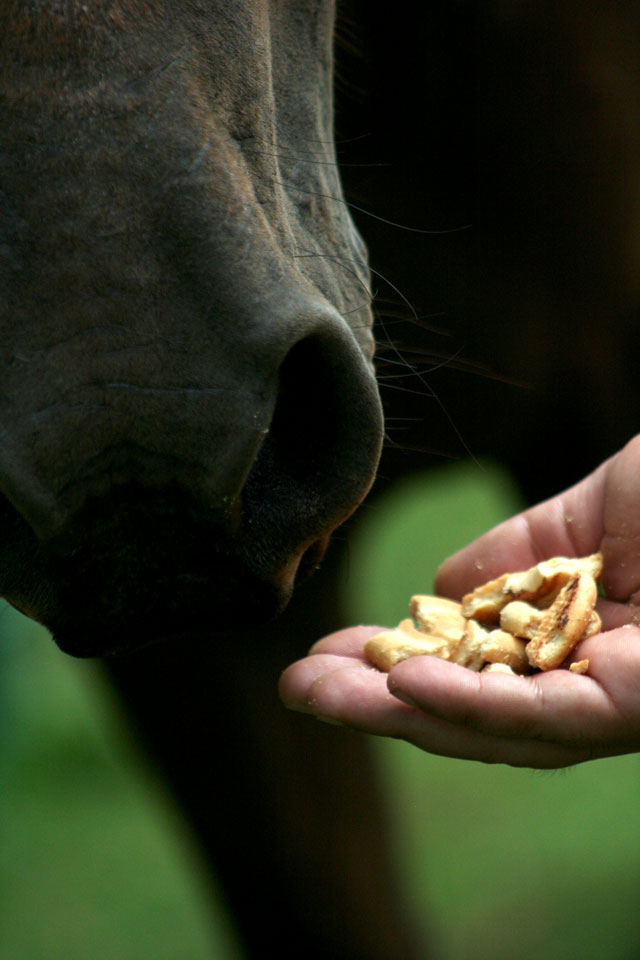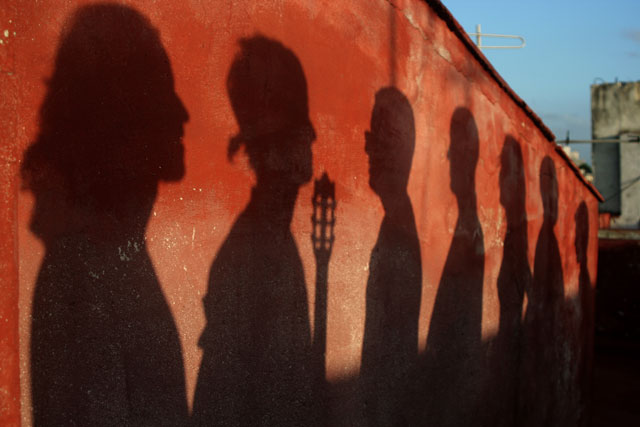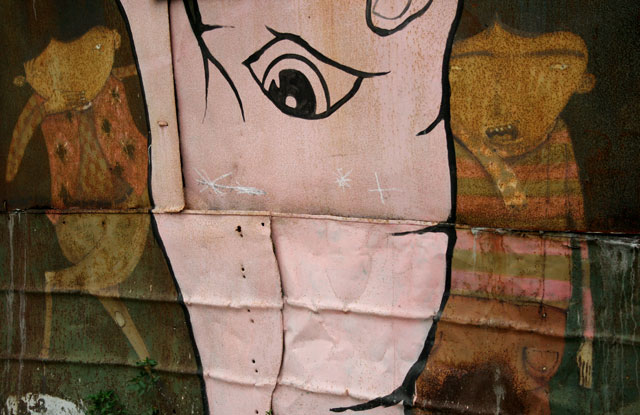Armed to the Teeth Against Us / Lilianne Ruíz
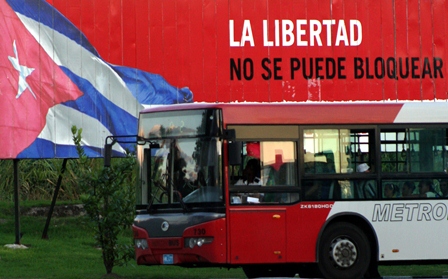
I wonder if these cameras they say they have that locate someone anthropometrically, they have so as to lift the economic embargo. Says someone who has gone hungry. All the Alfa Romeo pursuers, and the amount of wages in a population where the number of police are growing disproportionately, and the gasoline to cruise the neighborhood and every time you go out you seen one and even two and even three. The only thing we would get from lifting the embargo is financing for more of these monstrous beasts. We will be getting ever poorer and our watchers and pursuers more sophisticated.
April 7 2012
The Cuba Camila Vallejo Didn’t Want to See / Yoani Sánchez

We were still trying to complete the reports of the arrests during the Papal days and the living room of my house was a hive of friends telling stories of cell blocks and house arrests. The vice-president of the University of Chile’s Student Federation (Fech) came at a bad time, I thought. But then I realized that the celebrations for the 50th anniversary of the Young Communist Union had just begun, and it all started to make sense.
The two islands in which I live were all mixed up in my head: the Cuba of the official celebrations with smiles and slogans, and the other one, that of dissidents forced into cars and prevented from attending a Catholic Mass.
The tracks Camila Vallejo would follow once she arrived in our capital would be difficult, almost impossible, to know beforehand. On one side was the circle of protection — and control — that surrounded her, and on the other, the “long shadows of the watchers” who follow me everywhere.
To make it more difficult, the events on her agenda would occur inside schools or political institutions, where the public is winnowed to the most reliable. So Camila and I would travel in two dimensions that very rarely touch, in two worlds separate and incommunicado, between which all the bridges have been blown up.
But there remained at least one terrain where some type of dialog was possible. I took my cell phone, the same one that had come to life just days before. I wrote a short text message and sent it to the phone number of the social network Twitter, an accidental and blind road numerous Cubans use to narrate the island in 140 characters. “I would like to talk with @Camila_Vallejo but the official circle around her is unassailable,” read my short trill into cyberspace.
By then, two men in plaid shirts had prevented me from approaching the Auditorium of the University of Havana where she presented her book, “We Can Change the World.” As I approached, one of them questioned me: “Get lost, you will not gain entry here.”
I confirmed, then, that there would be no blonde wig nor bushy mustache that would serve to as camouflage to allow me to sneak into the place. I resigned myself.
A few hours before my tweet appeared on the great World Wide Wed, Camila Vallejo visited with a group of young people from the University of Computer Sciences. She and Karol Cariola, secretary general of the Chilean Communist Youth, were met with a wave of smiling faces, applause and admiration.
In the audience, dozens of young people paid silent attention to her stories about the situation of education in Chile, the students’ demands, and the details of the street protests. A University Federation that was not able to organize a single spontaneous March in the last 53 years, heard the anecdotes of asphalt and strikes that came to them from the south.
Among those listening were, without a doubt, the most promising computer scientists in our country, but also the police who crawl the web. There was the creme de la creme of “Operation Truth,” in charge of denigrating on the internet those with views contrary to the system, and attacking sites critical of the government of the island.
Camila and Karol talked opposite our virtual soldiers, before our riots of thought. Those who use not rubber bullets but insults, not fire hoses but stigmatization and slanders about the defenseless nonconformists.
The other meetings ended up marking the strictly official character of the charismatic Camila Vallejo’s visit to our country. She exchanged opinions and hugs with the secretary general of the Young Communist Union of Cuba, the grayest of all the obedient leaders this organization has had. The Chilean was still enveloped in the glamor that always accompanies her, but subjected to the hidebound and obedient protocol of her Cuban counterpart.
A curious paradox, from her anti-hegemonic posture in her country, Camila passed to sharing a word and a smile with the hegemony of official Cuban thinking. She also shook hands with the current president of the University Student Federation (FEU), Carlos Alberto Rangel, who fulfills the sad role not of representing the interests of the student body to the powers-that-be, but rather the reverse.
So the leader of an organization without autonomy posed for a photo with the promising figure who, in 2011, shook Chilean reality and raised in passing strong sympathies and antipathies in the rest of the continent and the world. The Cuban FEU tried, in this way, to reap a share of the irreverent aura that accompanies Camila Vallejo, knowing that disobedience is a posture that, for five decades, has not resonated on the wide steps of the University of Havana.
Each handshake offered by these cadres formed in opportunism, was like an urgent ritual to appropriate the image of the young rebel. However, whenever their eyes met they realized that, had she been born here, they would have pushed her — without mercy — to exile, to prison, or to wearing a mask.
On her personal blog, Camila Vallejo had fanned the flames of the controversy before arriving in the largest of the Antilles. “Cuba is not a perfect society, nor does Chile have to follow its path,” she declaimed, and this single phrase already marked a distance with relation to the most outdated postulates of our official discourse.
But she also made the mistake, as many do, of identifying our country with the government that directs it, our nation with the ideology in power. Camilla wanted to share with her readers a reflection “on the paradox of the discourse of those who criticize Cuba so rabidly, or those who feel love and respect for her,” not realizing that in that statement she was incurring a confusion as hard to remove as the roots of marabou weed are from Cuban soil.
The so abundant reproaches are not directed at our national identity, nor at the palms that grow in the plains, nor at a culture that, in the last three centuries, has produced writers, artists and musicians of universal scope. The contrary opinions are not aimed “at Cuba” but rather directed to a government that has penalized differences in thinking and kidnapped our voice.
If the injustice of identifying the millions of people who inhabit this island with a sole ideology is not dismantled, then the sad situation of citizens born here being called “stateless” or “anti-Cubans” for having opinions different from those of the Communist Party will continue.
I invited Camila Vallejo for coffee, precisely to debate these injustices and misunderstandings. I did it via Twitter, because I am aware that trying to direct a word to her in public would be taken — at the very least — as an attack. But the hours passed and the sign of a possible meeting never came.
A week earlier Benedicto XVI had also declined to listen to other voices from our illegal civil society. The Ladies in White had asked Joseph Ratzinger for one minute of his time, in exchange the Cuban government arrested many of them and prevented many others from leaving their homes.
With the recently arrive geography student it wasn’t necessary to trigger a wave of repression in the style already known as “Operation Vote of Silence,” it was enough to lock the visitor in the official circle from which she could not extract herself. The rebel Camila obeyed these rules.
Later I learned from the press that — like the Pope — she had been talking to Fidel Castro. She had been taken to the quasi-secret place where the elderly ex president writes his long and delirious texts. The patriarch of the Cuban Revolution received the young woman who, for a while, managed to infect him with her aura of youth, of the future.
The same Comandante en Jefe who dismantled all traces of student independence — burdening it with controls, informants and purges — declared his sympathy for the stories of rebellion told to him by Camila Vallejo. That man, who stood out in his own time at the university for his tendency to confront power, ended up cutting off all roads so the young people of today cannot do the same to him. He who shouted himself hoarse in his younger years yelling “Down with the dictatorship,” ended up creating another and preventing the anti-government slogans.
The vice-president of Fech left the meeting with him declaring that “all the Reflections Fidel has written constitute light and hope for Chile.” She made it clear that an exchange of ideas and sips of coffee at my table was an impossibility. Official Cuba had abducted Camila Vallejo.
I picked up my phone again, the only and immediate way for people like me — who, in a country like this, will never get one minute on television, nor space for some lines in the national newspapers — to express an opinion. I sent another message, but without much hope: “Yesterday @Camila_Vallejo met with Fidel Castro. Does she have one minute for irreverent and rebellious youth?”
At the moment when I wrote these lines, I didn’t know whether she had been able to read my tweet, or if she, too, is suffering the problems of lack of internet connectivity endured by so many Cubans. I had no more than sent this invitation when there was a frantic ring ring echoing in my pocket.
I confess that at that moment I thought it was a call from this twenty-something of the perfect face and passionate talk who is a member of the Chilean Communist Party. But in reality the voice I heard on the other end was a woman desperate about the arrests in the east of the country.
She wanted to tell me how the political police raided the home of a dissident and took him, his wife, and various colleagues in the struggle away, along with a good part of his papers and books that they found in passing. She also told me about the three daughters of the marriage who were left in their grandmother’s care, until we learn if their parents are going to be prosecuted for some crime or are only being detained to intimidate them into ceasing to express themselves.
The other Cuba that had not learned of Camila Vallejo broke in on my telephone, calling on me for greater attention and responsibility than some journalistic romp of pursuing a delegation that moved only in secure, filtered places. I could not determine the age of the woman who had called and described to me the repressive wave in Palma Soriano and Palmarito del Cauto. I never knew if she was mixed, black or white; young, mature, old… But in my fantasies I saw her with an almost perfect aspect, sculpted with the mastery of Greek statue.
As she spoke, I constructed in my mind some cheekbones and a magazine-perfect chin, dreamy chestnut locks, a discouragement-proof youth. But a sob broke my digressions, a whimpering on the phone unmade that perfectly proportioned face and confronted me with the decomposed face of the real Cuba. The face I had wanted Camila Vallejo to also see!
Translated from an article in the Chilean newspapre La Tercera.
7 April 2012
Kids…
A 2nd Colloquium on Reggaeton and Problematic Social Situations in Cuba / Orlando Luis Pardo Lazo
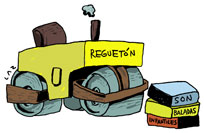 Reggaeton: a love story; Better bayuti[1] than dictatuti
Reggaeton: a love story; Better bayuti[1] than dictatuti
In real time, it’s illegible but the Cuban press has come to be very creative if it is read with a five year lag time, “chabacaneria”[2], luxury, lechery, lamentation, vice, consumption of toxicity, banality, corny-ness, trinket shops, flamboyant attires, cheesy bargains, and an ecetera half ethical and half ethnical. The self-titled “Cuban Youth Daily”put forward its best effort in the beginning to frame the coordinated condemnations of reggaeton, even if a bit late, with the flow of time and money, and has attempted several baby steps towards tolerance.
Why would the Cuban intellectual have to think or at least give some weight to reggaeton? Why isn’t it reggaeton that intrudes on the theory chorus of the cultural realm? To think is to possess. We want to put all phenomenon in the civil waistline of power. We can’t stand to be stuck outside the the flow of sense that, for its part, is a source of capital. We know that we can legitimize or stigmatize a genre of music that, while the more it goes along with a big mouth and sticks to people, the more voiceless and vulnerable it seems facing the Institution that is always a bit inquisitorial. for the moment we fool along (we make ourselves the fools). It’s still early to be passing judgement and maybe it was our turn before for a good piece of cake.
Reggaeton as a form of linguistic violence has always captivated me as a distortion of the Cuban norm (unconscious Cabrera infantilisms or translated captions something like the movie La Naranja Mecánica[The Mechanical Orange]). Any break-out or emptying of the language fascinates me, even when it closes upon itself and doesn’t blow up in the face of the social consensus.
In terms of textual terrorism, the territorial reggaeton slang in truth promised much more than it produced, but in Cuba this inefficacy far from being a sin, at these heights already, should be a constitutional preamble. We don’t come to any libertarian limits. We cross the line, yes, but only from a heavy conservatism, never out of fashion. Cuba as commodity.
The strange family sagas of the first texts that I have a poor memory of, with their twisted Oedipus-isms and certain common, criminal-esque places, soon were dissolving in the friendly media of the caricature. The themes ended before being completely explored, even before turning out to be interesting for our most restless intellectuality (worthy oxymoron).
There remain then the eternal twitches of Cubanity, the alpha macho uprooted or predatory, the mean and voracious girl, the consuming at an open bar (the CUC [3] as the measure of all things, the almighty buck as the only real event to be remembered in anniversaries) complete forgetting of those who died needlessly, hedonism before historicism, a certain “sexual promiscuity” and a lot of “moral relativism” (that still generates panic in the chorus line of our insular churches), and all the other aesthetics that pass for icons, brand name clothing, tattoos, glitzy jewelry, luxury cars, purebred pets, the mass orgy as a substitute for the organization of the masses, in the end, a final assault on all those delicate distractions that the ideological elite hid for decades by the frugal instinct of self-conservation.
When it’s allowed (with some possible exceptions) to be aired in official media, reggaeton pays homage to the popularity they charge for it under the table [4]; and pardon me those of you present here from the left, this bad metaphor, the announcers and radio producers, among other new actors of the Cuban post-socialism of the 21st century). The Quinquenio de Oro of this class does not stain its fingers with the ink of the “best pens of the Republic” as have been called its songwriters a bit in the style of “the best minds of my generation” of Allen Ginsburg, howled a lot but seldom criticized. More like attendance records and prohibitive prices for their spectacular spectacles not like the cock fighting rings but like vaudeville. No-one loses. Not even those who lose their heads only to lose their clothes in public in a corporal climax of the corporate show (there was even someone who involved their skin in the first comandante-esque tattoo in five discursive decades of the Revolution).
Precisely then, after the first putative death of Fidel, it was the Cuban state that began to find itself outside the game, victimized budgetarily, reggaeton-icized by an emerging industry much better than its functionaries. Tickets were running somewhere between the corrupt and the legal, between the clandestine disc burners and the video clips of national television (contaminating the increasingly professional artists and technicians) between the Makumba and Miami (it’s only an example) and the power doesn’t know how to boycott this short cut direct to the future, no, to the extreme future.
The little dogs, who knows if from the political police (it’s only another example), gave a hand to the ministerial marionettes. Here or there in every six months there rises some brilliant conference that rebukes reggaeton in the sacred name of the little people, that fascist totalitarian defect of the disguised demagogue of pedagogy. When the Premier of Culture himself appeared on the Mesa Redonda[5] of Cubavision Internacional(which is our de facto Parliament before the world) a fake head was chosen and it was so simple to deconstruct the remains of a slang that was barely mumbling genital syllables.
Case closed, comical circus , semantical of semen cyclical: chabacaneria,luxury, lust, lamentable, vice consumption of toxics, banality, corny, trinket shop, flamboyant attire, cheesy bargains (put on the hot underwear-uty, take down the wild par-uty, spit all-uty out the mouth-uty because the dictator-uty is here to order you to stop-uty [6]).
To the new class of non-consumers of Reggaeton, you’re within your right to defend the status quo of your governancead infinitum. For lack of rash intellectual attempts, the transition in Cuba could have well been able to slip into the background of the neighborhoodof the last tam-tam[7]. A lesson is necessary in order to expose the lack of solidarity of the trade (not even a single collection of signatures against the censorship) and the shunning by steps of its most successful leaders .
Now in the second stage of the rhetorical recruiting of Reggaeton as state lever, for sure a mutual pact in terms of taxes and resolutions against the delinquency of debt and infractions, ethical codes and sanctions including even for reasons of grammar, symbolic management salaries and permits in passports in order to allow departure from and return to the country with money, more so the customary community signboards, clearly, and perhaps these colloquiums or lectures where, to legitimize or stigmatize this idiot son of the post-modernity that, meanwhile the more lap dancing, bumping and grinding gets more promiscuity to the people, the more mute and defenseless it leaves us in the face of our own inquisition that’s always a bit institutional. We fool around for the moment (we make ourselves the fools ). It’s never too late to pass sentence and I believe it will be our turn before that nice slice of cake.
Translator’s notes:
[1] The word “bayu” in Cuban Spanish means a wild, orgiastic party. Adding a syllable to the end of that word enables reggaeton to rhyme the word bayu-ti with “dictadura” (dictatorship)which has the same syllable added to it to make dicatu-ti
[2] “Chabacaneria”: crass , loud , mannerisms of the street including vulgar sexual talk.
[3] Cuba has two currencies. There is the traditional CUP (Cuban peso, also known as “moneda nacional” or national money), and then there is the coveted CUC – Cuban Convertible Peso, thevalue of which is tied 1:1 to the American dollar. CUC enables the holder to purchase goods at government stores that sell goods from overseas, quality foods, luxury items in addition to anything that CUP can buy as well as purchasing or selling such items between private parties.
[4] the expression “under the table” in English is rendered as “by the left” in Spanish which is why the writer apologizes for the use of the metaphor.
[5] Mesa Redonda or Round Table is a nightly show on Cuban television where prominent academics and members of the government discuss matters of national and international importance.
[6] A satirical change of lyrics from a reggaeton song by Osmani Garcia about the joys of oral sex. The song can be heard at http://www.youtube.com/watch?v=hIsCs4g3maM.
[7] Drum circle or a drum of African origins.
Translated by: William Fitzhugh
February 25 2012
Adios Pope / Lilianne Ruíz
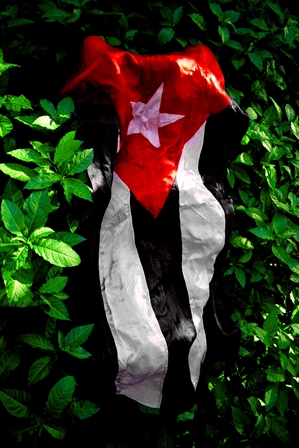 Eugenio was released in the afternoon, after the disastrous Pope took his plane back to Rome. But Augustin was still in a cell, because Eugenio saw him in passing, and also with him a member of “Los Aldeanos.” They have arrested many people. When I returned to my house I met in the elevator one of my very “integrated” neighbors, returning with his white cap and T-shirt and asked him if he had gone to see the Pope:
Eugenio was released in the afternoon, after the disastrous Pope took his plane back to Rome. But Augustin was still in a cell, because Eugenio saw him in passing, and also with him a member of “Los Aldeanos.” They have arrested many people. When I returned to my house I met in the elevator one of my very “integrated” neighbors, returning with his white cap and T-shirt and asked him if he had gone to see the Pope:
— No, I was in the Buena Vista cordon, in Playa.
— That’s a long way from the Plaza.
— But on the way to the airport.
— And all this was to protect the Pope?
— To keep anyone from getting close to him.
I insist that this may have been the orders even of the Pope himself, but in the case of Cuba not only for safety but because in this visit the opponents of the regime have been excluded once again. The Pope did not come as a champion to advocate for the rights of human beings not to be treated as a “species” without rights. The Pope came so that the Church would have more space for Public Relations. And while I believe in the Gospels, the Catholic way is not to preach a living Gospel, but merely liturgical ceremony.
The Pope did not met with the Ladies in White because having “little time” he did not consider what affects Cubans most a priority: segregation, political imprisonment. The Ladies in White are the only gladiators who “do not hide their face from the blows and spitting.”
The Pope is an emperor who judges sinners and seems to absolve from their blasphemies only the powerful. The power in Cuba is blasphemous, abhorrent to the human person and the Pope himself said at the Plaza that the measure of man is Christ.
I already knew this, because fortunately I did not learn the Gospel from any priest, any catechist, they could not save me from an adolescence marked by a manipulative and destructive mother like mine. God saved me, reading the Gospels, giving me peace, certainty, full identification.
I went out with my daughter to buy bread, because to all these hunger is also like Jerome’s lion. On the way back a dog followed us. A real dog, a hound, clearly a little less a dog than State Security. My daughter, like most children, is afraid of dogs, and I perhaps inspired by this terrible day, had heard me tell her: Dogs sniff your adrenaline and want to attack you, do not be afraid, one should not feel afraid of anything.
One should be afraid only of God to not offend him, respecting our neighbors and yourself respecting yourself. I don’t want her to forget me. I’ll have no more fear of state security, I fear only God who I can love because he has loved me even unto torture and death. And the Resurrection.
April 6 2012
FREE FLYERS / El Sexto – Danilo Maldonado Machado
Our apologies… the English version of this video is “broken”… we’re working on it!
Rip your mediocre (or narrow) fears with El Sexto, as if they were paper…
March 14 2012
Is it Good or is it Bad? / Luis Felipe Rojas

This question, among others, is shot at me weekly in an international poll about the potential and efficiency of self-employment in Cuba. Of course, it is not a bad thing to once again have goods produced by your own work- shoes and other products which disappeared from Cuban homes decades ago. It is good that thousands of my compatriots have broken away from the chains of bureaucracy to buy or sell a pair of pants. It’s good that they’ve moved away from the anti-pedagogical rules of orders and control.
It’s a good thing, and it will always be good, for people to learn how to plan their vacations and that, once and for all, an end is put to the damned meritocracy which has turned the work place into a battlefield of snitches who carry out their dirty work all for a summer reservation in a cabin at the edge of a river, or a ticket to buy a TV made in China.
In the long run, recognizing the weight which subterranean operations have on third world emerging economies, it should be fateful that we will have to sustain ourselves based on illegal extractions in order to strengthen the universe of what tomorrow will be known as the small business. The costs, the feasibility, and the usefulness are terms which become shreds when we discover that the prices of prime materials fluctuate, not according to internal or external markets, but according to the hands which release them onto the black market.
What is not good is the material shortage due to inflation of prices in the sole provider which exists: the sacrosanct state. Instead of ceasing to produce or ceasing to continue onward with small producers of goods and services, used for the first time by owners of their lowest fortunes, they prefer to turn their faces and buy the ingredients without finding out about their origin. That’s how they prepare themselves, also for the disloyal competition of tomorrow.
Articles and reports which appear on the daily (and only) press, telling the self-employer to carry out honest work, to treat their customers well, and to join the national economy which aims to re-fossilize, perfect itself, and tighten its chains to a corset of rules imposed as mandates of sole salvation. All this means nothing.
A native information technology business (CITMATEL) developed a software to allow the registry of personal data, any taxes or other things applicable to self-employment, and surely, it is not a bad thing. Of course, they have started to sell it for 250 Cuban pesos (about 12 dollars), with the added difficulty that the rate of workers in the private sector who actually own a computer is very low, and according to their own announcement, their license would expire in two months. It’s not a matter of whether if it is a good thing or a bad thing, instead, we ask: for who is it positive or negative what is happening if we continue mortgaging the future?
Translated by Raul G.
5 April 2012
Occasional photos…
People with HIV Have the Right to Not be Subjected to Cruel, Inhumane or Degrading Treatment / Wendy Iriepa and Ignacio Estrada
The right not to be subjected to cruel, inhumane or degrading treatment or penalties should be addressed in several ways in the context of HIV in Cuba, for example in the treatment of prisoners who are sick.
The penalty of imprisonment should not provoke the loss of those rights or of dignity. In particular, the State, through the penal authorities, has the duty to care for prisoners. This implies the duty to protect the rights, life and health of all people in their custody.
Denying prisoners access to information, education and means of prevention (disinfectants, condoms and sterile injecting equipment) with respect to HIV / AIDS, voluntary testing and counseling, confidentiality and health care to HIV/AIDS and the ability to participate.
The National Directorate of Prisons in Cuba has recognized a total of six prisons for inmates with HIV/AIDS. Prisons that do not differentiate between the treatment of healthy prisoners and the prison population affected by this disease.
Inmates who commit dangerous acts, such as rape and sexual violence should be punished regardless of their HIV/AIDS status. There is no reason for the health or security authorities to justify mandatory HIV testing or to refuse prisoners living with HIV the chance to perform all the activities available to the rest of the prison population. The only justification for segregation of people living with HIV in the prison population would be the preservation of their own health.
The Cuban state should consider that prisoners with a terminal illness, including AIDS, be given early release and given proper treatment outside prison.
https://www.ligacubanacontraelsida.com
March 19 2012
Letters from the San José Prison Part 3 / Wendy Iriepa and Ignacio Estrada
Mayabeque, Cuba.- My name is Denis Luis Gómez Serrano, I’m 26 years old, I’m a primary, it’s my first sanction. I would like to tell you that there are no psychotropic drugs here, and I left with permission and brought back my medication and now they want to sentence me to 8 more years of unlawful detention, when I was just about to be freed for finishing my term.
I had had HIV/AIDS for six years, when I became a prisoner, I came in as minimum security, getting a pass and everything since there are no medications here, they are always lacking, and since I have psychiatric problems I bring my medication from home and now they want to give me a longer sentence.
There are some 20 women here, and even they have knives because here you have to survive against the delinquency and neglect. You have to have weapons even if you don’t want to, even if you don’t have the courage to use them or else they’ll kill you. Here the black race is predominant. There’s no discrimination between us, the discrimination comes from the authorities because of our medical condition, if you go to a court and you have HIV/AIDS, they put you inside, so there are fewer people on the street with AIDS.
The authorities here, even the senior ones, know everything that is happening to us, they are the first ones that turn to stealing, imagine that to transfer to another detachment here in Baracoa, the head of internal order charges you $25, they are living with us here, the guard sell everything, food, drugs, the beds are $20 and there are sick people sleeping on the floor.
I want the world to know our situation and for international human rights organizations to consult with us.
Translated by: Megan Jantsch
January 23 2012
The Same But Different / Laritza Diversent
Pedro Valerino Acosta, 28, son of Pedro and Corina, was sentenced to 20 years in prison for killing Humberto Gonzalaz Otano, a jeweler in the neighborhood of San Miguel del Padron in the capital, a process that also resulted in sentences for 5 other people.
He had no criminal record, but he didn’t participate in the activities called by the Committee for the Defense of the Revolution. His neighbors “reject him for his maladjusted conduct,” said the judges.
According to the Havana Court, the existing proofs against him “are sufficient to name him as the intellectual author of these events.” In its sentence it affirmed that he sold the idea of burglarizing the goldsmith’s house, without specifying how, to the rest of the accused.
Valerino Acosta admitted that he put two acquaintances in the neighborhood in contact with the jeweler in San Miguel, who bought clothes and exchanged US dollars for convertible pesos.
The police say they all proposed to rob the place and the court that they participated in the meetings to perfect the plan, circumstances denied by the rest of those punished in court. According to the judges, the declarations of the accused vary, because of the bonds of friendship that untie them and because they stated in the same prison during their pre-trial detention.
However, recognizing that the declaration of the co-defendants was not proved, the court came to the conviction of his guilt, because along with Eduardo Serna, one of the witnesses who spoke in court, they visited the jeweler’s house. Also there was a relationship with the rest of the accused because of the ties of friendship and living the same neighborhood.
Soltero, with a 9th grade education and unemployed, Valerino Acosta is described by the judges as a tough guy who shows off shouting obscene words. “He frequently disturbs the peace and associates with anti-social elements, and has been an object of interest for the operative organs of the Ministry of the Interior,” they affirmed,
The instructor/investigator in the case, Capitán Yoelkis Céspedes Ramos,who according to the court showed the masterly manner in which the investigation was carried out, never explained why Serna was discarded as a suspect, if, like Valerino Acosta, he knew most of the accused and lived in the same neighborhood.
According to the families of the accused, Eduardo was not charged because a member of his family belongs to the Havana Territory Division of Investigations, a military arm in charge of investigating the case.
In Cuba, we are equal under the law, but having friends, or a family member with a position, or simply being well-off economically, can make the difference. Worse luck for Pedro Valerino Acosta, son of Pedro and Corina, who has no one to protect him.
April 4 2012
Praying to Ratzinger Between the Bars of the Revolution / Orlando Luis Pardo Lazo

The decor of the interrogation rooms was antediluvian, pure Soviet-style political propaganda, with quotes from Fidel Castro stuck to his early icons of the Revolution: the assault on the Moncada Barracks, the landing of the Granma yacht, Che Guevara’s arm in a sling, the wide-brimmed hat of the late Commander Camilo.
The dungeon looked newly renovated, with a certain look of having been straightened up by me, which rendered the neatness in terrifying detail. I felt an inconsolable loneliness in that basement of bars and colossal locks. I had never been imprisoned, I have no criminal record. In fact, this time I was hunted like a wild animal in the street. Without criminal charges against me. Without identification from the commando that kidnapped me (they never told my family or friends). Without legal documents for the arrest, seizure of property, and detention for two days: two days of Pope Benedict XVI in Havana, in a parallel installation of bliss and barbarism (Kafka 100% flush with the Caribbean Sea).
On the morning of Tuesday 29 March, on the eve of the Pope’s Mass at the Plaza of the Revolution, the Cuban capital awoke unhinged by a flood of officers in uniform or civilian clothes. They coagulated traffic. They coerced and captured countless independent journalists, human rights activists, political opponents (as well as beggars and unlicensed vendors). They did so right in the face of the international press correspondents, all concentrated on the altar of Joseph Ratzinger, or perhaps in the facial reactions of President Raul Castro before every subtlety of the papal homily.
From a few days ago, the State telephone companies — ETECSA CUBACEL — were complicit in the operation unofficially called “Vow of Silence” and blocked, without any technical reason, thousands of their users’ lines, without notice or right to compensation. They also cut all the very limited internet service, which in Cuba is the privilege of foreigners and a certain caste of officials.
From the beginning, I stopped eating and drinking water. Nor did I responded too much to the personal provocations of an attorney for State Security, like a character out of the film Minority Report, he wanted to buy time until the Pope took off for the Vatican, charging me with the words, without requiring evidence, “subversive activity” and “public scandal” with “preventative character.” Apparently, H.G. Wells’ time machine Wells retains all its functions intact in the Cold War Museum of Cuban Counterintelligence (or perhaps should be renamed the Cuban Countercitizenry).
Only one small battery radio, a gadget discontinued at the time of Cuban socialism, kept me connected to the world beyond our modern catacombs (the police station is across from the Regla cemetery). So I kept count of the passing hours (it was the world’s most endless night). Thus, already with symptoms of muscle weakness and lack of glucose in the brain, I finally heard the chorus of the only liturgical Mass kidnapped in the history of Catholicism.
It was a sad theater crammed with atheists workers, inspired unions more Stalinist than Marxist-Leninist, not to mention security personnel disguised as Red Cross stretcher-bearers or, who knows, as altar boys. Not even the parishes could choose freely who would attend and who is not among their faithful, as there were “black lists” with names that were promptly thrown under the official buses, which were the gateway to the Plaza of the Revolution: the tribune so often changed into a tribunal, where the blind masses and the Maximum Leader (excommunicated by Rome decades ago) have clamored hysterically for “Death to the traitors.”
When the Mass of His Holiness Benedict XVI seemed it would never end, I knelt instinctively and prayed for release from my cell. Not to God, but to the man Joseph Ratzinger in person. I asked him to abbreviate the stages of his rhetoric, to skip the Eucharistic formalities, and not to delay over the diplomatic greetings between the Catholic and Communist hierarchies, that would not repay the bullying of the Cuban Cardinal’s smile, that the Popemobile leave at top speed from the altar itself directly to Havana International Airport, so as not to commit heresy, I prayed that no Pope ever again accept an invitation to repress the poor people of this or any other country-prison.
Saint Bartholomew’s Night / Lilianne Ruíz
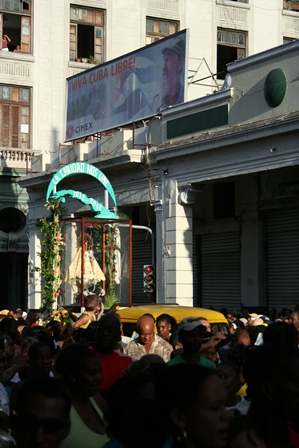 This morning I had invited some friends to watch the Mass at the Plaza on television, and afterwards to talk. The last call I got yesterday evening was from my friend Agustin, before the political police stopped him, was to tell me that he had talked with Felix, the pastor of the beautiful Baptist Church, and that he had let him know that the whole area were I live would be closed off to access, and we would see each other after the whole thing was over.
This morning I had invited some friends to watch the Mass at the Plaza on television, and afterwards to talk. The last call I got yesterday evening was from my friend Agustin, before the political police stopped him, was to tell me that he had talked with Felix, the pastor of the beautiful Baptist Church, and that he had let him know that the whole area were I live would be closed off to access, and we would see each other after the whole thing was over.
I don’t remember seeing such a display of control by the government. Nor seen it look as ugly as in these days when they march and shout in the same plaza where the government celebrations are held. Everything is closed, Boyeros Avenue is so quiet since yesterday evening. Then in the morning, from afar, some people passed by and I compared it with the days of their Revolutionary marches when, at dawn, that would gather around the Plaza. We mustn’t forget that the Pope will officiate the Mass in front of a few believers and a multitude of paramilitaries.
First we notices that Ismael Diego disappeared, he’d gone out to look for cigarettes and was detained as on another occasion. Afterwards we knew he’s gone looking for Agustin. Later Orlando Luis Pardo Lazo and his girlfriend, they were also detained at some station. None were able to call their family or friends, we still don’t know where they’ve taken anyone.
The Vatican knows of these abuses of the dictatorship. We are treated like leaves, like stones, like animals, people without rights.
The dictatorship of “the good” has woken up to congratulations. Everything went well, the Pope behaved very well, he is not a dissident Pope. Somehow he’s awarded an ecclesiastical license to the regime to repress. They can’t even prove we wanted to go to the Plaza where this disastrous marriage was celebrated.
But the leitmotif had been announced with the Cardinal’s order to evict the protestors from the Cathedral, this will be the color of the Pope’s visit. We don’t matter, humans don’t matter, nor do Christians, what matters is the Doctrine, what matters are the negotiations that exclude these mundane sinners who want to be free and need Cuba to open itslef to the world and the world to open itself to Cuba. Agustin, my friend is a prisoner, Ismael Diego,Orlando Luis and his girlfriend, and so many others whom we will be finding out about because the cell phones were cut to block communication.
April 3 2012




